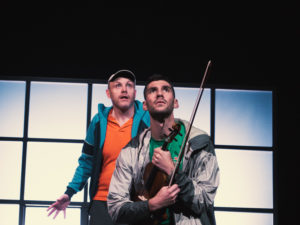 (3 / 5)
(3 / 5)
I have an unusual degree of uncertainty on how to review Motherlode’s latest offering “Exodus”. I say this because the majority of people around me were regularly laughing out loud, whereas I could only manage a couple of chuckles throughout.
I think there are two reasons for this.
The first being I had difficulty understanding the actors at times. In fact, Gwenllian Higginson a Mary, I only tuned into during the final twenty minutes. It pains me to say this as Gwenllian attended my almar mater, Rose Bruford College.
But she wasn’t alone, as I had problems ith the other two speakers, and as many of the jokes are quick fire, they just evaporated into thin air around me.
Also, the play is set in Aberdare, and there are a number of in-jokes relating to it, that I just didn’t get.
The odd thing is that for the past eighteen months, I have lived in Aberdare.
Written and directed by Rachael Boulton, “Exodus” is the company’s second production. It’s first, “The Good Earth” toured Wales and New York where it received a favourable review from The New York Times.
In 1865, a party of mostly Welsh people sailed on the “Mimosa” to start a new life in Patagonia – Y Wladfa. Aberdare was one of the places where colonists gathered prior to their embarkation. They left because of the social and religious problems in their own country.
Fast forward to today, and a party of four disillusioned daring Aberdare people decide to set off on their own adventure, piloting their plane to Cuba.
Along the way, they recruit, train and eventually head off into the sunset, using High Street Aberdare as their runway.
Along the way, there is much social comment, mainly uttered by Mary in lengthy monologues.
Where the production works really well is in it’s moments of physical theatre. By using clever lighting and a backdrop of a 5 square panelled window, with a scene of green hills and blue sky that cleverly illuminates the action – I particularly liked the blinding sun when the plane changed course. The use of Karim Bedda’s, (Timmy) violin skills accompanying the physical theatre also worked well.
The other two members of the cast, Liam Tobin as Raymond and Bewwyn Pearce as Gareth strive hard for laughs and the whole cast performed energetically throughout.
A special mention is reserved for the innovative programme.
The play tours Welsh venues and moves on to London, where I’m certain it will go down well with exiles, needing a nostalgia boost.
There are many excellent components found in this production – I just wished that I enjoyed it more.
Roger Barrington

